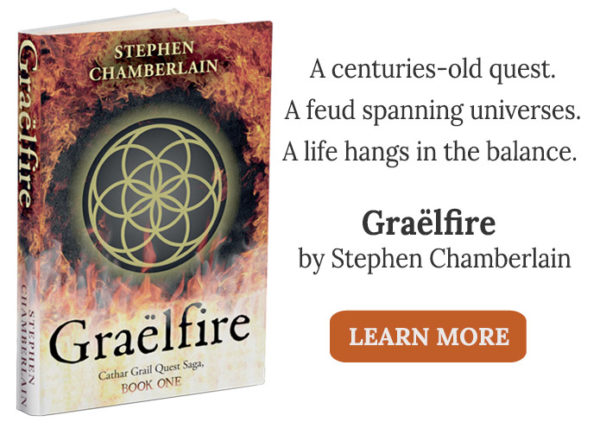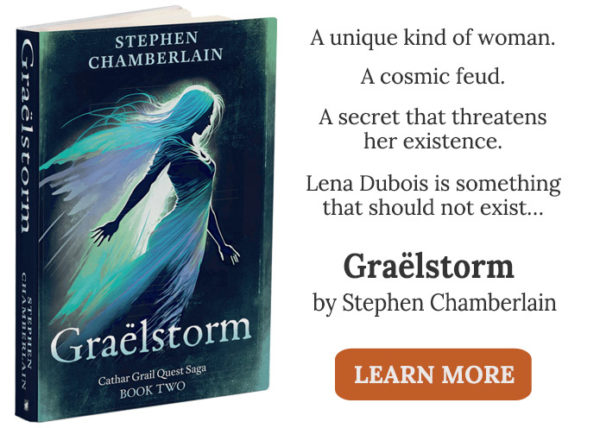“Watch the stars, and see yourself running with them.”
— Marcus Aurelius
Numinous is an adjective derived from the Latin word Numen, meaning divine will. In a more secular context, things that are numinous have an otherworldly quality that arouses a sense of wonder in magic or the supernatural.
The Other
The fun of fantasy is its air of otherness — of imagined worlds and supernatural beings. In my last blog post, I wrote about the challenges of bridging the boundary between imagination and reality, and how fantasy writers draw readers into stories by persuading them to suspend their disbelief. The technique I described focused on crafting plausible characters with credible reactions that an audience understands and wants to engage with.
The numinous is another tool in the fantasy writer’s kit, another way of engaging readers’ imaginations by evoking a sense of wonder in something mystical. To communicate that awe to their audience, writers must rely on their prose. Presentation is all. Anything can be numinous; anything can be worldly. It’s down to the way you write about it: how you make the reader feel, and how you craft the mood of the experience. When it comes to the numinous, words are the hooks that grab a reader’s imagination and induce them to let go of reality.
Sense of Wonder
There is no hard and fast rule about what constitutes the numinous, but however it is crafted it must inspire that sense of wonder. German theologian, Rudolf Otto, identified three components that he called mysterium tremendum et fascinans — a mysterious presence inspiring terror and fascination. Mysterium is a mystical quality outside anything we experience in ordinary life, tremendum inspires terror at an overwhelming power, while fascinans is an awe that is positive by nature. The tension between dread and wonder attracts us as much as it repels.
Numinous and Story
Otto was writing about a profound religious experience: an encounter with the Almighty. A secular supernatural encounter might be less intense, yet it may possess numinous qualities. For an evocation of a numinous place, read Susanna Clarke’s wonderful portrayal of Faerie in Jonathan Strange and Mr. Norell, or Erin Morgenstern’s description of the circus in The Night Circus:
“Beyond the ticket booth the only way forward is through a heavy striped curtain. When it is your turn, you pull back the fabric and step forward, only to be engulfed by darkness as the curtain closes again. It takes your eyes a few moments to adjust, and then dots of light begin appearing like stars, lining the dark walls in front of you…you are alone as you make your way tentatively forward through a maze-like tunnel…you have no way of discerning how far you have gone or which direction you are moving…finally you reach another curtain…The light on the other side is blinding.”
Morgenstern’s Night Circus is a magical place that is only open between sunrise and sunset. It appears without notice and leaves without warning. Observe how a patron doesn’t just walk into the circus. Rather, Morgenstern uses imagery that captures the liminal quality of entry in words that echo a sacred rite — the symbolic rebirth used in some traditional rites of passage to conjure the sense of the numinous.
For numinous descriptions of beings, read Philip Pullman’s His Dark Materials, especially his description of angels in the sky in The Subtle Knife. In Chapter 6, headed “Lighted Fliers,” he doesn’t just declare what he thinks angels are; he evokes their appearance in dazzling prose:
“They’re not beings of flesh, like us, they’re beings of spirit; or maybe their flesh is finer than ours, lighter and clearer…we see them sometimes in the sky, passing through this world on the way to another, shining like fireflies.”
Later Pullman writes the following:
“They shone, not as if they were burning but as if, wherever they were and however dark the night, sunlight was shining on them … They surrounded her, five huge forms glowing in the dark air, lit by an invisible sun…What they shared was a shimmering, darting play of intelligence and feeling that seemed to sweep over them all simultaneously.”
Then there is Frodo’s experience of the beauty of Lothlorien in The Lord of the Rings. Tolkien conjures it up as an earthly paradise that has Frodo lost in wonder when it is unveiled to him.
“A light was upon it for which his language had no name…he saw no colour but those he knew, gold and white and blue and green, but they were fresh and poignant, as if in that moment he had first perceived them and made for them names new and wonderful…No blemish of sickness or deformity could be seen on anything that grew…In the land of Lorien there was no stain.”
Frodo’s experience here is akin to a religious vision. It has a spiritual dimension, and an inexpressible quality, which is why Frodo finds no words to describe the beauty before him. Sam endorses this same indefinable quality when he speaks of Lothlorien. “If there’s any magic about,” he says, “it’s right deep down where I cannot lay my hands on it…” And Frodo responds. “You can see and feel it everywhere.”
For both Frodo and Sam, Tolkien created an emotional experience that lies at the heart of a numinous episode. He reinforces this sense of sacredness in Galadriel’s gift-giving scene, which is almost sacramental. As the quasi-divine elf queen says to Sam, “I have only a small gift…Earth from my orchard, and such blessing as Galadriel has still to bestow upon it.”
Mindset
Passages such as these are among the most memorable in The Lord of the Rings. But a numinous experience is a state of mind. It depends on the reader as much as the author. If readers do not want to be awed, no amount of writing skill can make them. The numinous appeals only to readers who acknowledge the possibility there is something bigger than themselves. Some may perceive that in the everyday world; others might deny it. In between there are those with an open mind. For these readers, it comes down to the suspension of disbelief again. It doesn’t matter if they believe in the supernatural. What matters is that they let go of any rational incredulity and enjoy the story.
Fantasy is a window into imaginary worlds. Its appeal lies in combining the rational and believable with the otherworldly. But if writers appeal to the mystical to transport us out of reality, they must convey a sense of wonder, for that is the essence of a numinous experience.

Stephen Chamberlain is the author of the fantasy novel Graëlfire. He draws inspiration from the impact of landscape on myth, and the association of liminality with the supernatural and magic. Stephen lives in Switzerland.



